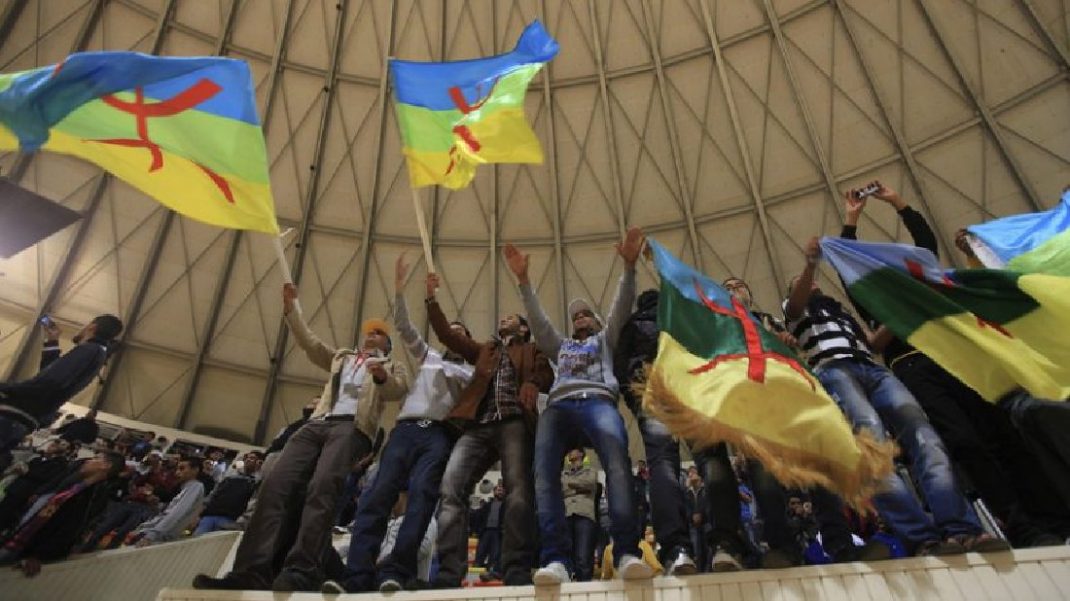By Jamie Prentis
The Amazigh, or Berbers, Libya’s largest minority group, experienced harsh treatment under Gadhafi’s regime. Gadhafi’s so-called cultural revolution in 1973 criminalized Amazigh traditions, prohibited the use of their native tongue, Tamazight, and declared the Amazigh to be Arabs despite their being indigenous to the land.
For Gadhafi, the Amazigh represented a separatist threat to his efforts to consolidate power and proclaim Libya an Arab nation. Today, the Amazigh are thought to comprise an estimated 10% to 15% of Libya’s population of 6 million. While the Amazigh are dotted around Libya, they are concentrated in the northwest, with the town of Zuwara considered to be their unofficial capital.
Abdullah Kabousa, a Zuwara municipality councilor, explained during an Al-Monitor visit to Libya, “Our conflict with Gadhafi was about our culture. … We are a part of this country.” Anti-Gadhafi protesters and fighters took control of Zuwara on Feb. 23, 2011, a few weeks after the rebellion against the longtime leader erupted in Benghazi.
Today in Zuwara’s Martyrs’ Square, the Amazigh flag blows in the wind. Shop signs advertise products in large Tamazight script, with Arabic below in smaller lettering. At the Zuwaran branch of Zawia University, a faculty focusing on Amazigh studies has been inaugurated.
“Under Gadhafi, we could not study or speak our own language, but now we can,” said Zuwara Mayor Hafez Ben Sassi, speaking to Al-Monitor. “It is important to me. I feel like I am supporting my people. Things were great after 2011. … We were working together with fellow Libyans.”
Yet amid the Amazigh’s initial joy, storm clouds appeared, and their optimism soured. In 2011, the National Transitional Council — the temporary post-Gadhafi administration — adopted an interim constitution, and in late 2013, the Constitutional Drafting Assembly (CDA) was created to write a permanent constitution. Only two of the assembly’s 60 seats were allotted to the Amazigh, who felt insulted given their history and because they represent 10% to 15% of the population.
The Amazigh, challenging the assembly’s composition, refused to participate in it. They also boycotted parliamentary elections held on June 25, 2014. Despite the Amazighs’ boycott of the CDA, some of their leaders were able to review the various drafts of the constitution. Among them was Khairi Hamisi, a member of the Amazigh Supreme Council (ASC). Hamisi told Al-Monitor, “It is still not good enough. The constitution is wrong.”
The 18-member senior body of the ASC liaises on behalf of Libya’s Amazigh community with the United Nations, the CDA and the government. It is composed of six mayors, including Ben Sassi, and another 12 elected members.
The Amazighs’ key issue concerns equality. Hamisi said that the Amazigh — as the original inhabitants of what is now Libya — want their culture and Tamazight to enjoy the same status as Arab culture and the Arabic language. They want it enshrined in the constitution. Tamazight would thus be included in passports, for identification cards and on currency and so on.
For now, the temporary constitution remains in place, along with the Amazighs’ unfulfilled demands. Amazigh officials are currently threatening to boycott parliamentary elections and a referendum on the new constitution later this year if their rights and culture are not recognized.
“A certain degree of autonomy for the Amazigh is also desired in terms of education and local security,” Hamisi said.
Two events earlier this year greatly raised security concerns among the Amazigh. On Jan. 2, a militia in eastern Libya abducted Rabie Al-Jiyash, an Amazigh activist, allegedly for speaking Tamazight. He was later released.
Days later, on Jan. 5, pro-government forces attacked territory controlled by predominantly Amazigh forces near the Tunisian border, leading the ASC to warn of a potential “ethnic war.” The reason for the attack remains unclear, but a cease-fire was declared and the attacking forces withdrew.
The ASC led the election boycott in 2014, but it has yet to decide which path to take regarding this year’s polling and the constitutional referendum. “If the constitution is not to our liking, we will either ignore it or vote against it,” Hamisi said. “If it is nonetheless approved by the rest of Libya, despite our displeasure, and elections go ahead, we have not yet decided whether or not to boycott the polls.”
“The constitution is the most important problem. [Our] recognition is crucial,” said Ben Sassi. “We want to be seen as equal, and people have to realize that the Amazigh are an ethnic majority not a minority.” In the eyes of the Amazigh, much of the argument for equality is based on the principle that Libya is not an Arab nation, but a multicultural state.
“Libya is not a one-dimensional country of Arabs that belongs to some sort of Islamic republic,” said Fathi Ben Khalifa, the former leader of the World Amazigh Congress, an international organization that protects and promotes awareness of the Berber culture.
“We are not part of the Middle East or the Gulf. We are Libyans, we are from North Africa,” he emphasized to Al-Monitor at his base in Zuwara. “Democracy is imperative, and this includes recognizing minorities.”
Ayoub Sufiyan, the head of the Apuleius Foundation, a think tank, believes the Amazigh movement has increased in fervor because of the ascendance of human rights.
“The Amazigh community wants its rights in light of an increased awareness about these rights,” Sufiyan said. “It will not stop until it gets what it wants. I think one day this will happen. Eventually Libya will recognize its identity. Libya is not an Arab state, it is multiethnic.”
Locals like Kabousa continue to insist they simply want to be equal. Comparing the Amazigh to the Native Americans, he remarked, “Everyone has come to live with us. This is ok, but please respect us.”
***
Jamie Prentis is a journalist based in Tunis who makes frequent trips to Libya.
______________




